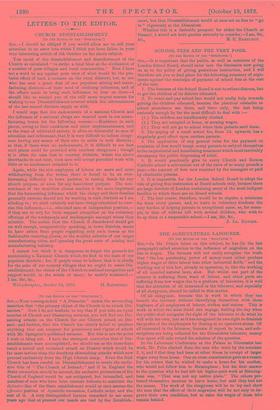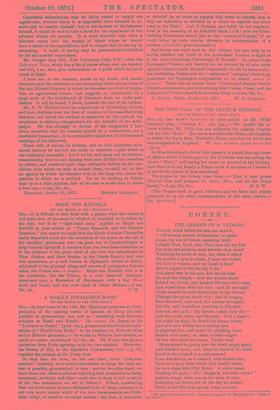THE AGRICULTURAL LABOURER.
[TO THE EDITOR OF THE "SPECTATOR."]
SIR,—In Mr. Price's letter on this subject, he has (in the last. paragraph) called attention to the influence of migration on the rise in wages. The farmers will not easily recognise the truth that "the less purchasing power of money must either produce higher wages or drive labour into other industrial fields," and the working out of this law, already in operation, is, like the working of all unaided natural laws, slow. But -whilst one part of the country is suffering from want of labour, and other parts are- suffering from low wages due to a plethora of labourers, it is well that the attention of all interested in the labourer, and especially of all clergymen, should be called to this matter.
Of all clergymen, because this is work in which they can benefit the labourer without identifying themselves with those bugbears of all employers of labour, strikes and anions. This is work in which the most timid can engage, waiting the day when the public shall recognise the right of the labourer to do what he- will with his own, just as it has recognised its own right to diminish. the profits of the shopkeepers by dealing at co-operative stores. Of all interested in the labourer, because if report be true, and sub- scriptions are being collected for the Dorsetshire labourer, money thus spent will only retard the solution of the question.
In the Labourers' Conference at the Palace in Gloucester last week, Mr. Price elicited from the men who went by the numbers 2, 4, and 6 that they had been at other times in receipt of larger wages away from home. One on cross-examination gave as &reason for his return that he wished to make a home for his mother, who would not follow him to Birmingham ; but his first answer to the question why he had left his higher-paid work at Birming- ham was, "That was not my native place." The others pro- fessed themselves anxious to leave home, but said they had not- the means. The work of the clergyman will be to try and show the men that the effect of their migration will be not only to im- prove their own condition, but to raise the wages of those who remain behind.
Charitable subscriptions may be fairly raised to supply the capital sum, without which it is impossible for a labourer to re- move and to resettle himself ; but in the interest of the labourer himself, it would be well to take a bond for the repayment of the advance within six months. It is most desirable that when a labourer comes into the receipt of larger wages he should have a check on his expenditure, and be taught that he can lay by something. A habit of saving may be permanently established by the six months' experiment.
Mr. Alsager Hay Hill, New University Club, S.W., edits the Labourers' News, which has a list of places where men are wanted, and will, I am sure, give information on a point which he has so much at heart.
I have not, at the moment, access to my books, and cannot therefore give the reference to an interesting letter among those of the late Edward Denison in which he discusses the effect of migra- tion on agricultural labour, and suggests an experiment on a large scale of the withdrawal of labourers from an under-paid district. It will be found, I think, towards the end of the volume.
Mr. E. W. Holland tried the experiment of forwarding widows and their children from the East of London to the manufacturing -districts, and found the readiest co-operation on the part of the employers in making arrangements for the transfer of the work- people. He was strongly in favour of the suggestion I have -above recorded, that the transfer should be a commercial, not a -charitable transaction, to be eventually repaid out of the increased earnings of the labourers.
There will, of course, be failures, and in this impatient nine- teenth century we are but too ready to condemn a plan which is not uniformly successful ; but if we try and carry out the scheme, remembering that we are dealing with men fallible like ourselves by nature, and rendered more than ordinarily fallible by the con- ditions from which we wish to release them, we shall set on foot an agency by which the labourer will, in the long run, attain the position to which he is entitled. Let us do nothing to bolster men up in a false position, but all we can to enable him to attain a true one.—I am, Sir, &c.,



































 Previous page
Previous page